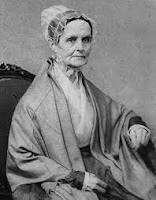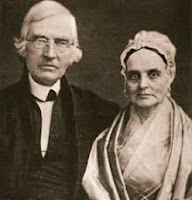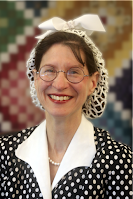Born two hundred and thirty years ago on Nantucket Island, Massachusetts, Lucretia Coffin Mott was the second of five children. Initially a ship’s captain, her father changed professions so as not to be away from home for long periods of time (to say nothing of the hazards of the job). The family moved to Boston where he became a merchant, although he was apparently not an astute businessman; he left the family “a mountain of debt” upon his death in 1815 according to one source.
As members of the Religious Society of Friends (Quakers,) Lucretia and her family were firm believers in the equality of all people regardless of gender or race. This philosophy would prompt her later activities which began as a new school teacher when she discovered that male teachers were paid significantly more than female teachers. She married fellow Quaker James Mott in 1811, and they would go on to have six children, five of whom lived to adulthood and all active in anti-slavery and other reform movements.
However, being a wife and mother didn’t seem to be an impediment. By 1821, she was a minister ofthe faith and traveled extensively. She spoke on a number of topics, but her sermons are said to always include anti-slavery messages as well as exhortations to be involved in “free produce,” boycotts of goods produced by slave labor. Lucretia and her husband were both active in William Lloyd Garrison’s American Anti-Slavery Society in the 1830s, and she was one of the founders of the Philadelphia Female Anti-Slavery Society in 1833.
Undeterred by criticism that she was not behaving properly as a woman, she continued her activities. Despite being appointed a delegate to the World Anti-Slavery Convention in London in 1840, she was prohibited from participating in the event, prompting her involvement in the women’s rights movement. Eight years later, she helped organize the Seneca Falls (NY) Convention where fellow activist Elizabeth Cady Stanton presented the “Declaration of Sentiments,” a document that inserted the word woman into the language of the Declaration of Independence as well as eighteen female-specific demands.
The years passed, and she continued to make her voice heard, speaking at conventions and publishing Discourse on Women (referred to by one source as a reasoned account of the history of women’s repression). She also continued to fight for an end to slavery. She protested the Fugitive Slave Act and was a stop on the Underground Railroad for years. In 1866, at the age of seventy-three, she was elected the first president of the American Equal Rights Association. Apparently, she hadn’t slowed down yet.
Opponents of women’s rights used various arguments including quoting from the biblical book of Timothy as well as making medical claims that women were inferior. As a result, she published her “Sermon to Medical Students.” Oh, and she also made time to found Swarthmore College near Philadelphia, still considered a premier liberal arts college in the U.S.
Lucretia passed away on November 11, 1880, and her legacy continues. Have you heard of her?
As members of the Religious Society of Friends (Quakers,) Lucretia and her family were firm believers in the equality of all people regardless of gender or race. This philosophy would prompt her later activities which began as a new school teacher when she discovered that male teachers were paid significantly more than female teachers. She married fellow Quaker James Mott in 1811, and they would go on to have six children, five of whom lived to adulthood and all active in anti-slavery and other reform movements.
However, being a wife and mother didn’t seem to be an impediment. By 1821, she was a minister ofthe faith and traveled extensively. She spoke on a number of topics, but her sermons are said to always include anti-slavery messages as well as exhortations to be involved in “free produce,” boycotts of goods produced by slave labor. Lucretia and her husband were both active in William Lloyd Garrison’s American Anti-Slavery Society in the 1830s, and she was one of the founders of the Philadelphia Female Anti-Slavery Society in 1833.
Undeterred by criticism that she was not behaving properly as a woman, she continued her activities. Despite being appointed a delegate to the World Anti-Slavery Convention in London in 1840, she was prohibited from participating in the event, prompting her involvement in the women’s rights movement. Eight years later, she helped organize the Seneca Falls (NY) Convention where fellow activist Elizabeth Cady Stanton presented the “Declaration of Sentiments,” a document that inserted the word woman into the language of the Declaration of Independence as well as eighteen female-specific demands.
 |
| Courtesy National Park Service |
Opponents of women’s rights used various arguments including quoting from the biblical book of Timothy as well as making medical claims that women were inferior. As a result, she published her “Sermon to Medical Students.” Oh, and she also made time to found Swarthmore College near Philadelphia, still considered a premier liberal arts college in the U.S.
Lucretia passed away on November 11, 1880, and her legacy continues. Have you heard of her?
PLEASE VISIT THE BLOG TO COMMENT ON THIS POST
___________________
Linda Shenton Matchett writes about ordinary people who did extraordinary things in days gone by. A native of Baltimore, Maryland, she was born a stone’s throw from Fort McHenry (of Star-Spangled Banner fame) and has lived in historic places all her life. Linda is a volunteer docent and archivist at the Wright Museum of WWII and a former trustee of her local public library. She lives in central New Hampshire where she enjoys exploring historic sites and immersing herself in the imaginary worlds created by other authors.
___________________
Linda Shenton Matchett writes about ordinary people who did extraordinary things in days gone by. A native of Baltimore, Maryland, she was born a stone’s throw from Fort McHenry (of Star-Spangled Banner fame) and has lived in historic places all her life. Linda is a volunteer docent and archivist at the Wright Museum of WWII and a former trustee of her local public library. She lives in central New Hampshire where she enjoys exploring historic sites and immersing herself in the imaginary worlds created by other authors.
Maeve’s Pledge
Coming March 21, 2023
Pledges can’t be broken, can they?
Finally, out from under her father’s tyrannical thumb, Maeve Wycliffe can live life on her terms. So what if everyone sees her as a spinster to be pitied. She’ll funnel her energies into what matters most: helping the less fortunate and getting women the right to vote. When she’s forced to team up with the local newspaper editor to further the cause, will her pledge to remain single get cropped?
Widower Gus Deighton sees no reason to tempt fate that he can find happiness a second time around. Well past his prime, who would want him anyway? He’ll continue to run his newspaper and cover Philadelphia’s upcoming centennial celebration. But when the local women’s suffrage group agrees that the wealthy, attractive, and very single Maeve Wycliffe act as their liaison, he finds it difficult to remain objective.
Pre-order Link: https://amzn.to/3k5zyIs






Thank you for posting today. I never have heard of this woman before. I'm happy that this blog highlights some of these women warriors. It's a great example of a person being able to influence what's known as the "norm" without having to use negative actions or violence.
ReplyDeleteI have not heard of her before. Thanks for posting this bit of history. I really enjoy reading and learning about a lot of women in history and why they really should be brought up.
ReplyDelete